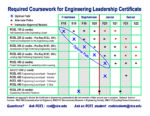Certificate Program Requirements
The certificate program is challenging. It is intended for students who are motivated to commit the time, effort, and personal discipline needed to engage in a rigorous learning experience that will help them develop into effective engineering leaders and team members. Following is a summary of program curriculum requirements.
Required Coursework
The core of our certificate is built around a sequence of integrated coursework taken throughout a students time at Rice. Each class, described below, emphasize different yet interrelated skill and topic areas.
RCEL 100: Self-Awareness & the Engineering Leader (2 credits)
The purpose of this course is to prepare students to become future engineering leaders. Engineering leadership is an emerging innovation in both education and practice and our course will prepare students to begin their development journey toward this end. The course is a front-end requirement for RCEL’s engineering leadership certificate and premised on the assumption that leadership is an honorable activity that can be learned.
RCEL 200: Personal Development for the Engineering Leader (2 credits - Pre-Requisite RCEL 100)
The purpose of this course is to prepare students to become future engineering leaders. Engineering leadership is an emerging innovation in both education and practice and our course will prepare students to begin their development journey toward this end. This is the second half of the initial RCEL leadership course (RCEL 100).
RCEL 241: Engineering Internship Practicum (0 credits)
Applied practicum and internship course that provides guided career and professional development for engineering students in a real-world industrial, academic, research, or other professional context. Prepares students to assimilate quickly and to exceed employer expectations during their internships.
RCEL 300: Development of High Performing Engineering Teams ((2 credits - Pre-Requisite RCEL 200)
The purpose of this course is to prepare students for engineering leadership and followership roles in engineering contexts. This course is required for our school’s certificate in engineering leadership and includes a focus on practical skills and how these skills can be learned, developed, and applied in team situations.
RCEL 400: Leading High Performing Engineering Teams (2 credits - Pre-Requisite RCEL 300)
This course prepares students for engineering leadership and followership roles emphasizing the interaction and integration of teams in an enterprise. In addition to exploration of enterprise issues, the course includes a focus on early career practical skills. Students learn the principles of engineering leadership, strategies for leading engineering teams, and managing interactions across teams. This course is required for the certificate in engineering leadership.
RCEL 450: Project Management & Leadership Action Learning(2 credits)
Course provides instruction on the tools, techniques, and leadership characteristics required to successfully execute a project. The course addresses the phases of project execution—initiating, planning, executing, monitoring and controlling, and closing as part of the project. The course also offers a practicum experience that allows students to practice leadership skills in an applied context.
SELECT ONE (1 credit):
RCEL 410 Engineering Launchpad - Research
RCEL 420 Engineering Launchpad - Industry
The purpose of this course is to prepare students for engineering leadership and followership roles in an industry context. This course is required for our school’s certificate in engineering leadership and includes a focus on the practical skills needed to thrive in an industry environment.
RCEL 430 Engineering Launchpad - Pathways
Engineering students explore alternative professional paths, including policy, law, medicine, industry consulting, and other viable career options beyond industry and research. Students will identify a focus career track and complete a series of assignments designed to increase familiarity and competency in that discipline.
RCEL 440 Engineering Launchpad - Entrepreneurship
Leadership and Entrepreneurship are like skiing...you can understand all of the science behind making the perfectly carved turn, but until you ski down a slope it's only theory. In the past, entrepreneurs were taught to make a business plan and to pitch it to investors, but research has shown that 95% of all new ventures fail because they have a lack of customers, and not due to a technological issues. This course will focus on identifying the value proposition a potential venture has for a specific customer segment, and who those customers are and why. Students will be forced to "get out of the building" and interview potential customers to help refine their assumptions based on data. The goal is to help the teams create a scalable and repeatable business model.
 The recommended course track is shown graphically here. Click image to enlarge.
The recommended course track is shown graphically here. Click image to enlarge.
Other Certificate Requirements
Leadership Development Plan
The purpose of the Development Plan is to understand one’s personal leadership capabilities, synthesize the “lessons learned” from experiences, and use experience to manage the development of the capabilities needed to become an engineering leader.
Engineering Leadership Portfolio
The leadership portfolio is a tool to synthesize leadership-related learning experiences, including coursework, involvement in student organizations, competitions and conferences, as well as other achievements, such as filing a patent. The purpose of the Portfolio is for the student to organize and reflect on their experiences, ultimately showing their development as a leader during their time at Rice. The Engineering Leadership Portfolio is an ongoing process throughout the Certificate curriculum and is completed during the student's senior year.
Final Leadership Presentation
The final certificate presentation by each student marks the conclusion of the Certificate learning experience. The 15-minute oral presentation highlights and synthesizes the key takeaways that have shaped each student’s leadership development and perspective on engineering leadership. Through the presentation, Certificate students must provide evidence of learning and growth grounded in experiences and demonstrate analysis and reflection of their development.
